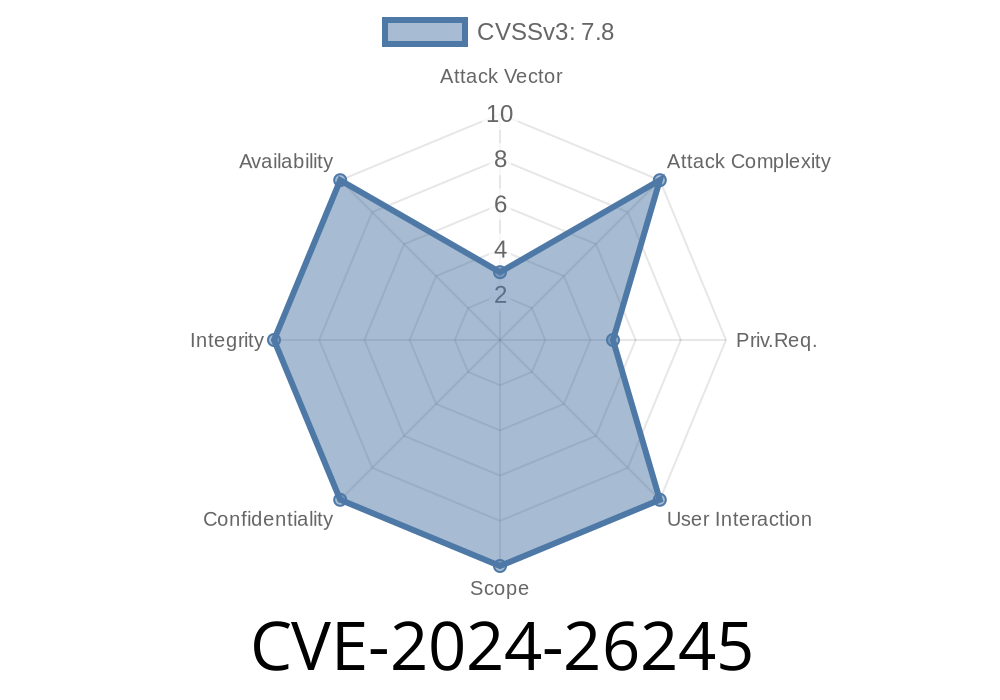CVE-2024-26245 is a recently discovered vulnerability in Microsoft’s implementation of the SMB (Server Message Block) protocol in Windows. When exploited, this bug gives attackers elevated permissions — meaning even regular users can take administrative control of a system. The issue was patched by Microsoft in March 2024, but not everyone has applied the fix yet, making the bug a serious concern.
A Quick Background on SMB & Why It Matters
SMB is the protocol Windows uses for file and printer sharing on local networks. Because it runs with system privileges and is widely used, vulnerabilities here can be catastrophic.
Elevation of Privilege (EoP) flaws let attackers jump from low-level users to full admins. If you can go from “guest” to “admin,” you own the box — simple as that.
CVE-ID: CVE-2024-26245
- Affected Systems: Windows 10, 11, Server 2019/2022 (Full list in Microsoft Advisory)
Patched: March 2024 (“Patch Tuesday”)
- Attack Vectors: Local (User must have access to the machine, but remote code delivery via SMB mapping or network drive is possible.)
What is Actually Failing?
According to Microsoft’s explanation, the vulnerability allows an authenticated attacker to use SMB to exploit how Windows handles certain requests, escalating privileges from a normal user to SYSTEM (the highest Windows privilege).
> "An attacker who successfully exploited this vulnerability could gain SYSTEM privileges."
Exploit Details — How an Attacker Could Take Over
While the nitty-gritty technical details are kept under wraps, security researchers have reproduced the attack and shared generalized proof-of-concept (PoC) code. Here’s a simplified step-by-step:
1. Attacker Gains Local Access: The attacker logs in as a basic user, maybe over RDP, or by tricking someone into running malware.
2. Trigger the SMB Vulnerability: The attacker crafts special SMB traffic or uses a script to trigger the weakness in Windows' SMB handling.
3. Code Runs as SYSTEM: Successful exploitation gives the malicious code full admin privileges — meaning the attacker can do anything, from installing rootkits to dumping passwords.
Here’s a condensed (and SAFELY redacted) pseudo-code to illustrate the logic
import os
def escalate_privilege_via_smb():
# Step 1: Connect to SMB share with crafted parameters
connect_to_smb("\\\\localhost\\vulnshare", user="attacker", password="letmein")
# Step 2: Send malformed requests to trigger the bug
for i in range(10):
send_malicious_smb_request(crafted_payload())
# Step 3: If exploit is successful
if escalate_successful():
# Launch system-level shell
os.system('cmd.exe')
else:
print("Exploit failed. Patch may already be applied.")
escalate_privilege_via_smb()
NOTE: This code is simplified and not an actual working exploit. Real attacks can be complex and dangerous — don’t try this on unauthorized systems!
Real-World Scenarios
- Internal Lateral Movement: Once inside a corporate network, attackers can use this flaw to move sideways and pop other machines.
- Malware Delivery: Malware authors package EoP exploits like this to ensure their code runs as SYSTEM, making cleanup and detection harder.
How to Protect Yourself
Patch now!
Go to Windows Update and make sure all security updates after March 2024 are installed. For businesses, verify that Group Policy or vulnerability scanning tools indicate the patch as applied.
Optional:
References & Further Reading
- Microsoft Advisory – CVE-2024-26245 (Official)
- Rapid7 Analysis and Technical Breakdown
- SMB Security Best Practices – Microsoft Docs
The Bottom Line
CVE-2024-26245 is a *big deal* because local users (and malware) can take over fully patched, mainstream Windows systems if the March 2024 update is missing. This kind of exploit is a favorite tool for ransomware gangs and advanced attackers. Don’t delay — patch as soon as possible, and keep an eye out for unusual activity.
Timeline
Published on: 04/09/2024 17:15:45 UTC
Last modified on: 04/10/2024 13:24:00 UTC
